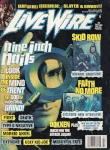
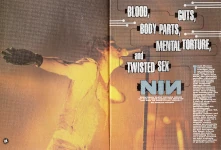
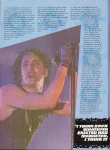
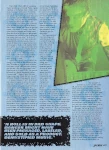
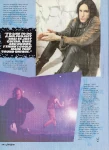
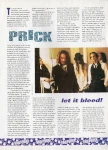
BLOOD, GUTS, BODY PARTS, MENTAL TORTURE, and TWISTED SEX
FRONTMAN TRENT REZNOR OPENS UP FOR A LOOK INSIDE THE MIND OF THE GOD OF INDUSTRIAL GRIND!!!
By Martin Popoff
There's no surprise really, that the stress point for The Downward Spiral is depression, in all its gray-black permutations, Trent digging deep within a do-it-yourself solitude made possible by an intelligence and sensitivity colliding with disgust at humanity. "Lyrically, the record's pretty well all autobiographical, basically me expending an emotion, letting it go. I wasn't trying to make a record that depresses people, although most of the inspiration was depression. For me it'll be therapeutic. I relate the lyrics to situations in my youth. When I was feeling depressed, certain records made me feel better, stuff like Pink Floyd and old Cure. It was good knowing that someone else was feeling the same way I did." He offers somewhat apologetically that his influences might seem a bit irrelevant these days, adding that his tastes were constrained by what he had access to growing up in a small town. The Downward Spiral is probably one of the most difficult releases of the decade thus far, truly repelling its three-legged rhythms and poisoned, sonically sabotaged layers. It is long, and it demands headphones. Selecting time and place for a downward spin is a challenge in itself, but rewards can by scraped and foraged from the record's bewildering smorg of sounds. Surprisingly enough, the album finds its self-lacerated legs within its second half which many may never have had the patience to reach. "Nine Inch Nails was starting to box itself into a corner, having to be harder and faster and noisier all the time, which, when I sit down to write, is not always the way I'm feeling. I'm trying to go more fullrange. My main criteria is to make it as challenging to me as I can and to live up the standards I set for myself without repeating things I've done before." With Trent, one gets a sense of his contempt for the whole circus ride that is his life. His remarks point to a mixture of exuberant participation and dreams of escape. But overall, one gets a sense he's master of his chaos, calculating every move with a sound realization that all is fleeting and bound to fade. "The main goals I have set for my life, which I foolishly thought would bring me some sort of satisfaction, I have achieved being where I never thought I would be. I have to remind myself when I am sitting around depressed or when I don't feel like writing that I am fortunate to be able to make a living doing this. Five years ago I was literally cleaning toilets. I much prefer working in a studio! It's cool to be grinding away, knowing that someone out there has an interest in what I come out with. That usually makes me feel that much worse." Trent finds it fairly difficult squeezing these records out of himself. "Sure, I guess creativity is my highest ideal. I mean, I play music because I have to, but the writing process is not something I do for fun. I'm not one to say I can't wait to sit down and write. I find it painful and I don't exactly know why. I need to find the self-discipline to make myself find time when I can inspire myself, also making sure I have the tools around me to get my ideas down. I have a short temper and I tend to get frustrated a lot. When I'm stuck, I have little tricks like just stopping and doing something else that usually gets me going again. Sometimes ten minutes of just walking up the street clears my mind." In terms of process, Trent works on music and lyrics "separately but simultaneously. I have a bunch of ideas in both departments, then at some point I'll editorially decide which fit to which, try to make some make sense and try to make some not make sense. In terms of maybe being satisfied with my body of work, so far I feel I can write much better stuff than I've done before. Give me a couple more years, then I'll start dancing in traffic." I asked Trent about other stuff he's listening to currently or has admired in the past. "Probably my biggest hero is Bowie. He's been a huge influence both musically and lyrically. I also like Morrisseys' lyrics". Favorite act of all time? "KISS", he answers followed by a barely detectable snicker. Current stuff? "I haven't heard the new Kyuss record, but I liked the last one, and definitely Pantera. Amazing guitar sound." In general however, Trent's cynicism at the whole biz seems to grow with every jaded day. "I think rock 'n roll is in bad shape. That's a very global statement, but it seems to me rock has become very homogenized, so incredibly safe and politically correct for the most part. Whatever danger might have existed at its inception has been packaged, labeled, marketed, and sold as product. And I blame that on MTV for pumping rock 'n roll into everybody's house twenty-four hours a day. I think it's demystified music. I also blame the birth of the compact disc, the corporate nature of record labels and small-mindedness of music programmers who work at radio or MTV. It's all led to a very safe, very conservative climate. Nowadays, you're a star if you have one song with a hit video. It seems to be crushing or overturning our so-called new wave of alternative music. I mean, what's alternative about Pearl Jam: they're a '70s rock band. R.E.M. is now considered alternative. To what? I want to see if they somehow work Aerosmith into the alternative." "As I become more and more disgusted with the music industry side of things and how silly the foundation of the whole thing is, I'd like to move ahead into something else. But I haven't had much time to explore what that might be. Four years ago, the tour bus started rolling, and I haven't had an extended period of time off where I can clearly assess the situation. In that time, pretty well every aspect of my life has changed, and I'm not yet fully aware of all the resources I have available. I'd like to get more into production and soundtracks. I'd like to do a Nine Inch Nails project that is just guitar, bass, and drums, with no obvious electronics other than treatment. I think I could make that sound unique. And my lyrics I think are going to change a fair bit, based on what I'm putting into my notebook these days. There's a million things I want to do." So is it all moving too fast? "In a way, yes, I wish I had more time to devote to different things that come up. For example, in between tours we had five weeks off, and in that time I finished editing a whole soundtrack, did a Nine Inch Nails song, re-mixed another song, worked on three new videos and all at the same time. I don't think your best work can come from that forced situation. You need a little more time to allow creativity to happen naturally. If I could change anything?.... On the one hand, I really want to do a long tour, and on another, I really want to be in the studio for some insane reason." One gets the feeling that The Downward Spiral's blood, guts, body parts, mental torture, and twisted sex are like a detachable set of sorry circumstances from the functioning whirlwind of work that is Trent Reznor, finding in the man no apology or even recognition about the horrific qualities of the record. Again, it comes down to a guy using the absolutely newest tools of the trade to expunge the demons that are crowding his cranial ranch. It's a lonely pursuit and Trent is not all that concerned about what his fans get out of it. Although he feels cognizant of the public when writing, he just hopes they have the same urges he does. If they don't there's nothing he can do to accommodate them. He remains focused on riding out the tasks at hand, playing the role of control freak and, as much as he likes to downplay his skills, media manipulator. And in the spirit of good central planning, the tour is a balls out spectacle, lots of people, lots of effects, lots of attention paid to reproducing the Spiral scratch with human hands versus silicon chips. Finally, Trent offers these thoughts on the anniversary of Kurt Cobain's suicide, measuring his words with a true empathy which kind of took me by surprise. "I didn't know Kurt. It's a real shame.... I started thinking about it, and really couldn't think of anybody else in his position who really took their life willingly, except maybe Ian Curtis from Joy Division. Mostly, I just felt sad. I wasn't the biggest Nirvana fan in the world, but I just thought what a shame - just really, really sad. I'm sure his addictions had a lot to do with his lack of clarity, but if he hated rock 'n roll, he shouldn't have done it. People need to realize that suicide is definitely not the answer. I've felt that way, I've thought about suicide and I've been close to it, but at the end of the day there are always alternatives." There's that word again. Bonus article: PRICK - let it bleed! --Kelly Barbieri
To look at Kevin McMahon, one wouldn't think that the introverted, soft-spoken man seated before you would be capable of the intense anxiety and barely suppressed rage that is encompassed on his album, Prick. While it is not made clear whether Prick is merely the name of his album or if it is the moniker of McMahon's current project as well (his answer depends on his mood when the question is put to him), it is crystal clear that the basis of this project is one of constant contradiction, as well as a healthy dose of double entendre. A good example of this is "Animal", the recently released single off the album. Upon the initial listening, one can find references that are undoubtedly anti-fur. Listen to it again and images of drug dependence emerge, underneath those images is a tale of maddening sexual attraction. It is not often that someone masters the art of twisting words quite the way Kevin McMahon has, or uses that art as effortlessly. "I do mean for the songs to have more than one meaning.” McMahon states, “It really comes very naturally to me, its a gift from someone or something, I guess. I notice that it happens in a lot, I could be writing about something on the surface then the words just click into something else. I don't really strive for it, it wouldn't happen if I did." The album which is on Nothing Records, took a year and a half to record and spanned nine studios, internationally. "I kind of like recording in lots of different places." Kevin explains, "You can take a song that has burned itself out in one studio, listen to it somewhere else and it sounds different. You can get a whole new idea that you wouldn't have gotten otherwise. It gives you a fresh perspective." The diverse recording conditions also gave new life to songs that were previously released with Kevin's prior band, Lucky Pierre. Kevin shares the merit for the resurrection of melodies with the album's producers, Trent Reznor and Warne Livesey. "I really wanted the both of them to be producers on the album." he says, "It was great from the beginning because they didn't have to do it. Their attitude wasn't like, 'Let's just make the record and get out.' Both of them were working on it cause they liked the music, so there was a really good camaraderie. The song "Communiqué" was recorded and released a couple of times, but I was never really happy with the way it came out. I liked the song so much that I redid it again for this album with Trent in New Orleans. It seems like I write songs, but they're not really finished until they reach that final apex. It's kind of like painting. Painters just keep on pulling out their canvases and putting more paint until they think that it's done. The only problem is that sometimes--if they go too far--they fuck it up." Because of the Lucky Pierre, McMahon's musical ingenuity was highly regarded in Cleveland. Unfortunately, the band never really made it out of Michigan. Seeing that his success was doomed to be severely limited unless a major change was made, he decided to pack up and move to Los Angeles, where he finally got on track. Much like Trent Reznor, all the songs on the album; music and lyrics, were written by Kevin alone. This left him with the same problem that his old friend had in the past: He needed to piece together a band for touring purposes. Fortunately, in LA, musicians are plentiful, but finding one's with Kevin's form of integrity proved more difficult than he thought - but he thinks he has the problem licked; maybe. "In LA, sometimes it doesn't even matter what your sound is." he sighs, "I had people coming in and auditioning that were just concerned about what label the band was on and what TV show we were gonna do. Their priorities were not where I wanted them to be and I was bit worried, I mean, I had to get something together for a tour, didn't I? Going out on stage alone just wouldn't be very convincing. I still don't know what's gonna happen with this band, I'm not even sure if it's gonna be a long term thing. It's difficult when you play someone else's songs, you can do it two ways: You can play it like a session musician, or you can live the music, like you were involved in the writing. If the people who are in the band now can make their parts breathe, that would be better for all of us. It's weird right now because no one really knows each other--they're all different people. We'll just have to see what happens."
Trent Reznor seems calm, resolute, bent on reflexively riding out the work, as Nine Inch Nails, the gleaming metallic, cyborgian futuro-entourage that is his bigger self, sodbusts through North American concert venues in support of the man's itchy new masterslab The Downward Spiral, NIN's flame-roasted wigging-out party, follow-up to a duo of stage-setting releases, Pretty Hate Machine and the breakthrough Broken EP from '92. We spoke in hushed, serious and deliberate tones to Trent, who despite his former rep as a difficult, crazy nugget, comes across as earnestly concerned with the thorny creative trip he has set upon. For Trent, it is all about the work, something he sees as a make or break on why anybody would ever ask him el grande queries.